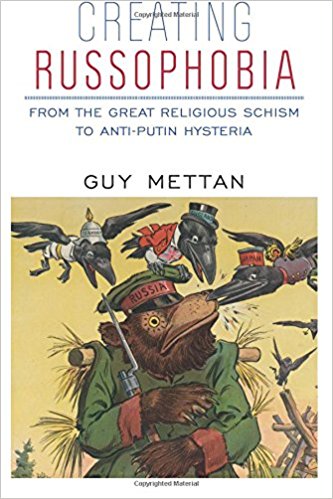Creating Russophobia: From the Great Religious Schism to Anti-Putin Hysteria
Guy Mettan’s Book on Russophobia Is a “Must Read” for Any Person Interested in Russia

Initially, I planned to write a ‘regular’ review of this book, but by the time I finished reading it I realize that nothing short of a standing ovation would do justice to this absolutely remarkable book. Guy Mettan produced a masterpiece which ought to be on the “must read” list of every person interested in Russia. So let me tell you why this book is amazing.
For one thing, this is one of the best and clearest study of russophobia I have ever read. Second, it is one of the few studies of this topic written by a non-Russian (Guy Mettan is a Swiss author, reporter, editor and political figure). Last but not least, the book is very short, less than 500 pages, which for such a complex topic is truly remarkable.
 Guy Mettan (image right) uses a very systematic, step by step, approach. He begins by giving a few examples of the incredibly anti-Russian way a few well-known incident have been covered in the western press: the crash of Überlingen, the Beslan hostagecrisis, the 2nd war in Ossetia and the Olympic Games in Sochi. Mettan could have used another 500 or so examples, but with these four he makes an irrefutable case that the western media does not even try to report honestly from Russia and that all the western elites care about is Russia bashing. Mettan then uses the Ukrainian crisis as his strongest proof and lists numerous examples of, shall we say, deliberate western blindness. By the time you are done with the first part of this book you will see that russophobia is simply not a deniable phenomenon.
Guy Mettan (image right) uses a very systematic, step by step, approach. He begins by giving a few examples of the incredibly anti-Russian way a few well-known incident have been covered in the western press: the crash of Überlingen, the Beslan hostagecrisis, the 2nd war in Ossetia and the Olympic Games in Sochi. Mettan could have used another 500 or so examples, but with these four he makes an irrefutable case that the western media does not even try to report honestly from Russia and that all the western elites care about is Russia bashing. Mettan then uses the Ukrainian crisis as his strongest proof and lists numerous examples of, shall we say, deliberate western blindness. By the time you are done with the first part of this book you will see that russophobia is simply not a deniable phenomenon.
But Mettan does not stop there, however. He goes one step further at looks at the history of the various russophobias (plural).
Here is were Mettan is at his best and where he has the courage and intellectual precision to look as far back as the 9th century to look into the first and most important cause of all the russophobias in the West: the schism resulting from the attempted coup by the Franks in the West to first usurp the power inside the Western Roman Empire, here they succeeded, and then take control of the Eastern Roman Empire (incorrectly called “Byzantine Empire” in western parlance), here they failed.
Mettan speaks of the “soft power” (in English) of religion in the VIIIth century and compares the position of the Holy Roman Empire of the German Nation against the “Byzantine Empire” to the NATO stance against Russia today. And while this kind of insight will definitely earn Mettan many sneers, he is absolutely correct: as soon as the Frankish controlled Papacy broke away from the rest of the Christian world it became obsessed with subjugating, converting and destroying the Orthodox world. You cannot understand modern Russia and her position in the world unless you understand the 1000 year old Papist hatred for the original Christian world.
Logically, Mettan begins by analyzing the cultural and philosophical roots of this earliest form of proto-russophobia, the Papist hatred for the original Christian world, but he soon switches to more recent forms of russophobia. They are the French russophobia, the English russophobia, the German russophobia and the American russophobia. Each of these empires hated Russia, much for the same reasons, but also in a different way and for unique reasons. And Mettan therefore logically concludes that the current American russophobia is really a combination of the other European russophobias.
Mettan concludes his book by a most interesting analysis of what he called a “russophobia how-to” in which he looks at how words are used, how topics are framed, how certain issues are simply never addressed and questions never asked. It is frankly a most discouraging and yet also most interesting read. Reading Mettan’s conclusions I was left wondering if this 1000 year old river of hate would ever dry up. On the one hand, as long as the West is under the influence of messianic ideologies, imperial delusions and racist views of the “other” I am not very optimistic (messianism, imperialism and racisms are all western creations). But on the other hand, russophobias were always the product of Empire, be it the Papacy, or the modern Anglo-Zionist Empire. “Normal” countries really have not need for any russophobic ideology or worldview. And since the current US Anglo-Zionist Empire is probably the last western Empire of any kind, there is good hope that imperialism, as a phenomenon, will finally bite the dust. If that ever happens, and I believe that it will, russophobia will finally end up in the same trash heaps of history as all the other ideologies whose sole purpose was to rationalize and explain away western wars of conquest.
There is absolutely no objective reason whatsoever for Russia and Europe to be enemies. Guy Mettan’s book is a formidable deconstruction of the imperialist mindset and as such it is truly a “must read”. It is short, very well written and deserves to printed in million of copies. Alas, this is clearly not going to happen, at least not as long as the media is controlled by the Empire.His book, published in french in 2015, has been translated into italian, russian, swedish and serbian and must be published in chinese next year.. In the meantime, I want to thank Guy Mettan for his formidable contribution to the understanding of this important phenomenon and express my hopes that as many people as possible read his superb book.
(This article is a shorter review originally published by The Saker.)
Order Guy Mettan’s book directly from Clarity Press
Title: Creating Russophobia: From the Great Religious Schism to Anti-Putin Hysteria
Author: Guy Mettan
Publisher: Clarity Press (June 15, 2017)
ISBN-10: 0997896523
ISBN-13: 978-0997896527
.
.
.
.


